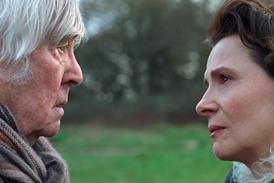
The Berlinale’s new festival director Tricia Tuttle has spoken for the first time about the controversy surrounding the festival’s awards ceremony on February 24.
Tuttle appeared before members of the German Bundestag’s Culture and Media Committee on Wednesday afternoon (April 10) to discuss pro-Gaza speeches and other incidents at this year’s Berlinale.
Tuttle said: “As an international festival, it is really important that we continue to represent and be open and welcoming to everyone in the world.
“We are trying to maintain spaces where Israeli and Palestinian filmmakers can speak in a way that they can feel safe. What never helps is when the dialogue becomes escalated or there are any bad faith misrepresentations. I believe genuinely this is where we create danger for filmmakers, so the most important thing to me is that we as leaders need to de-escalate, continue to raise awareness and learn from dialogue.”
The controversial closing-night gala saw several filmmakers, including Brazil’s Juliana Rojas, Ben Russell and Guillaume Cailleau and Golden Bear-winning director Mati Diop, voice their solidarity for the Palestinian people on stage.
Subsequently, politicians including Berlin mayor Kai Wegner; Joe Chialo, senator for cultural affairs; and Melanie Kühnemann-Grunow, spokesperson on media policy for the Social Democrats (SPD) criticised the Berlinale for the speeches.
Tuttle said: “Speaking as someone coming from outside of Germany, many people from outside the country find it difficult to understand the added sensitivity and complexity that some of the debates have here.
“Over the last months I can say that personally I have gained a deeper understanding of how much the Holocaust must be kept in mind when talking in Germany about the question of antisemitism. But, of course, I don’t want to relativise it because debates about the Middle East can be very polarising no matter where they are and, as a festival community, we have to be sensitive to antisemitism and reject it.”
She added that in her first seven days in the new post as festival director, she had already seen “that we have a very capable and passionate team at the Berlinale and it is one that is very openly committed to creating a fair and inclusive space.
“I’m building a new leadership structure which I hope will bring a lot more capacity for reflection, dialogue, forward planning and for communication so that we can act rather than react when critical moments arise.”
In March the Berlinale started advertising for a new-look executive team to work with Tuttle, including a director, Berlinale Pro, to oversee the European Film Market.
Tuttle said that she takes “very seriously the question of diversity and inclusion in the teams I work with and also in how we address audiences and in our positionality.”
Tuttle attended the committee meeting together with the Berlinale’s former executive director Mariette Rissenbeek and the State Minister for Culture and Media Claudia Roth who also made statements on the events at this year’s Berlinale and responded to questions from politicians on the committee.
The committee’s chairperson Katrin Budde said that Berlin’s governing mayor Kai Wegner and the festival’s former artistic director Carlo Chatrian had both been invited to attend the meeting, but neither of them had responded to the invitation.

























No comments yet